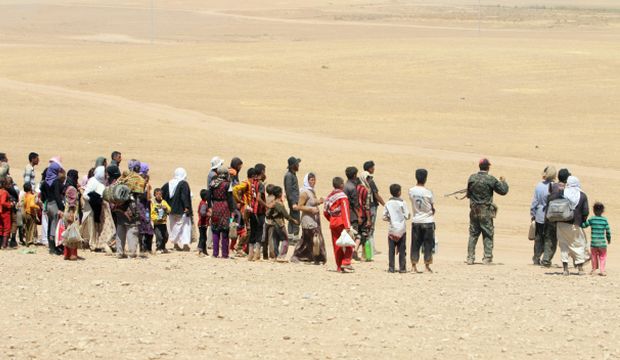
Displaced people from the minority Yazidi sect, fleeing violence from forces loyal to the Islamic State of Iraq and Syria in Sinjar town, make their way towards the Syrian border, on the outskirts of the Sinjar Mountains, near the Syrian border town of Elierbeh of Al-Hasakah Governorate, on August 10, 2014. (Reuters/Rodi Said)
Erbil, Asharq Al-Awsat—Thousands of Iraqi Yazidis have suffered a hideous ordeal over the past week, trapped in Iraq’s Sinjar Mountains after seeking refuge there from attacks by the Islamic State of Iraq and Syria (ISIS).
The family of Maloul Jambuland is just one of thousands of Yazidi families that fled from ISIS, finally reaching a refugee camp in Dahuk after walking for days from Mount Sinjar.
As tears streamed down his face, Maloul told Asharq Al-Awsat: “We woke up to the sounds of shooting close to us. We could hear the sounds of gunfire and clashes between Peshmega forces and ISIS. We had previously told some of our relatives that if ISIS took control of the city, we had to leave quickly. So we took some food and headed towards Mount Sinjar.”
“We fled and did not stop to defend our areas because we were not armed. We could do nothing but flee towards the mountain,” he said.
Asked about his family’s time in the mountains, Maloul went on to describe a nightmarish seven-day ordeal of hunger, thirst, disease, and violence.
“We could not reach the mountain’s peak and so we stayed at the foot of the mountain. There were thousands of families scattered across the mountain. We stayed there for seven days which I consider to be the worst days of my life,” he said.
Amid terrible scenes of abject misery, they waited on the mountain, unable to gain access to the humanitarian supplies airdropped by US planes. “Dozens of children, the aged, the sick, and pregnant women would die each day in front of our eyes from starvation, thirst, and snake and scorpion bites,” Maloul said. “We did not receive any assistance from the planes because this assistance went to those who were able to climb to the top of the mountain. As for those of us who were at the foot of the mountain, we received nothing. We were about 13 kilometers [8 miles] away from those at the top of the mountain.”
The displaced Yazidis also suffered from periodic attacks from ISIS fighters, Maloul told Asharq Al-Awsat, “forcing some of those among us who were armed to respond. Two of our number were killed in these clashes.”
The same day he spoke to Asharq Al-Awsat, he learned that his aunt had died attempting to escape to Syria, overcome by the rugged terrain. Maloul himself only escaped to Dahuk after Kurdish Peshmerga fighters cleared a path between the town and the mountain.
The Yazidis who remain trapped on the top of Mount Sinjar are in the process of being airlifted out by Iraqi and Kurdish forces.
“Although I am here in a safe place, I want them to arm us so that we can return to [the town of] Sinjar and liberate it from ISIS. I arrived here with my family, and my brothers and their families, two days ago after walking from the mountain to Dahuk. One of my brothers is still trapped in southern Sinjar, and is now stuck in areas under ISIS control, and we do not know his fate,” Maloul said.
He also spoke of the atrocities that had prompted his people to flee their ancestral lands.
“ISIS gathered all the [Yazidi] men together and then they [ISIS fighters] began to undress and rape their wives and daughters in front of their eyes,” he said. “Then they began mass executions of the men, taking the women and children . . . ISIS has taken hundreds of our women and children,” he said.
“My village, Kojo, as well as the other Yazidi village of Hatimiya, are completely besieged by ISIS. They gave a deadline for the Yazidi village of Taqan [south of Sinjar] to convert to Islam, otherwise ISIS will kill them all.”
He added that Yazidis in his own village had announced they had converted to Islam, only for ISIS fighters to return to demand to marry their daughters as proof of their conversion. But the villagers refused, only to be given another deadline.

Trackbacks/Pingbacks